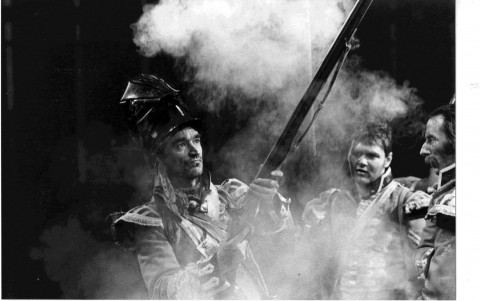 The Deep Concern.
The Deep Concern.
I directed four episodes of this six-parter and it was a memorable fiasco!
The problems I believe began with the series Gangsters which David Rose had produced the previous year. It had been very successful critically but had also drawn a lot of flak for the violence and for the portrayal of Birmingham as a gangster city. David felt that he had to rein in and chose to commission a conventional country house mystery serial and turned to his former colleague (and onetime Head of BBC Drama Series) Elwyn Jones to write it. Elwyn Jones was a master of television series writing with a long line of credits including Z Cars andSoftly Softly.
David offered the scripts to several high-flying Directors who all turned the job down. I was working at the time in the Regional Drama script department at Pebble Mill with Michael Wearing and Peter Ansorge. I was not a member of their staff but was “on attachment” from my post as producer/director at the Open University. I was there to gain experience and explore possible career paths. At the OU I had directed several studio based literary dramas but had no experience of popular television and very little experience of filming.
I feigned an interest in the scripts to David Rose and, without actually lying, I convinced him that I could do a good job directing them. It was typical of David’s adventurous approach that he took the risk of employing me, a complete novice in the field, rather than turning to an established director who would have doubtless done a competent job. If he could not have a rising star as a director, he would choose an unknown and live dangerously.
Once appointed, I set about working on the scripts with Michael Wearing. They were, frankly, dreadful. Full of cardboard cut-out characters, glib dialogue and unbelievable plot twists. There were whole boxes of misleading red herrings. The story centred on a group of international celebrities, all leaders in their field, who were brought together for a corporate conference in an English country estate. A dead body is found at the end of the first episode and I think there was a body per episode after that. I can’t remember who done it!
Elwyn Jones was extremely unwilling to do rewrites and provided only a few minor alterations in answer to our requests. Michael Wearing and myself arrived one day at his remote cottage in Wales for a script meeting. He opened the first bottle of fine claret at 10 am! He would not rewrite and he would not let us rewrite but he did let us cut. And we cut as much as we could. But despite stretching out the action to fill what had been cut we still under-ran. One episode (Ep 5, I think) was so short that it had to have a transmission slot which was a full five minutes shorter than planned.
The shoot was divided between location and studio and it would probably be a consensual feeling to describe it as “unpleasant”. As often happens with a bad script, the cast were embarrassed to be doing it and found scapegoats to blame for being there! The scapegoats included the catering and their fellow actors. I was far too inexperienced to deal with the egos that arose. Resentment built over the duration of the shoot; some actors were literally not talking to each other by the end of it.
And yet there was a group within the cast, philosophical and amused by their predicament, who could laugh about it and enjoy the experience despite the pain. I remember them all fondly.
Obviously the bosses in London didn’t like the series much and sat on it for several months before scheduling it in mid-summer. It got poor audience figures and was panned by the critics. Clive James reviewed it in The Observer and finished his review (I’m quoting from memory) “At the end of the first episode it is discovered that all the car keys have been stolen. So nobody can escape. Except us. Click.”
I’m sorry to say I have no photos from the shoot or any other souvenirs. I do remember The Birmingham Post taking photographs of our leading ladies (Katherine Schofield, Beth Porter, Yolande Bavan) on a vintage car.




